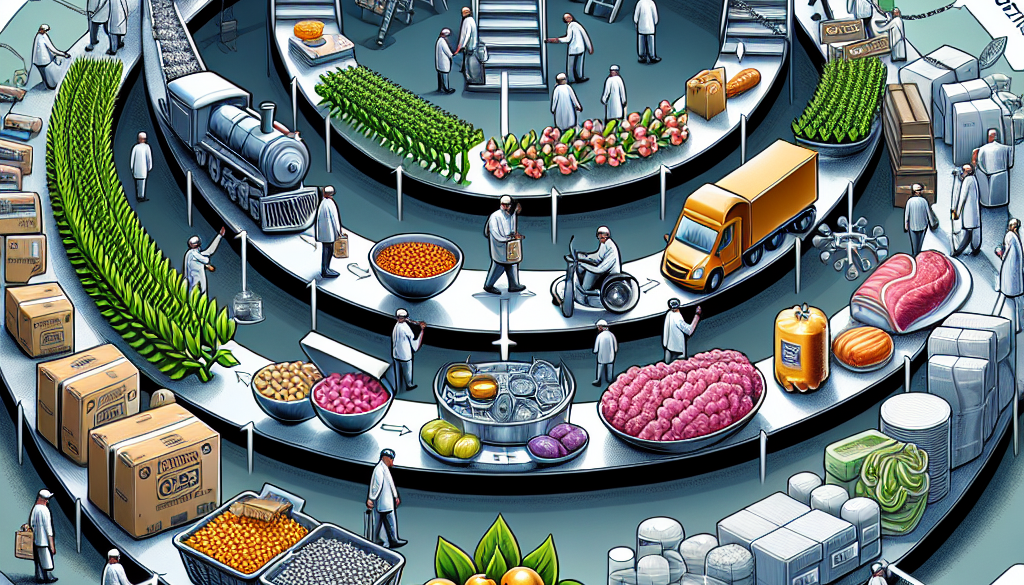GFSI Standards Implementation Can Save Lives: Make Food Safe for Consumers
-
Table of Contents
- GFSI Standards Implementation: A Lifesaving Measure for Food Safety
- Understanding the Global Food Safety Initiative (GFSI)
- The Impact of Foodborne Illnesses
- How GFSI Standards Save Lives
- Key Components of GFSI Standards
- Success Stories of GFSI Implementation
- Challenges and Considerations
- Conclusion: The Imperative of GFSI Standards for Food Safety
- ETprotein: Enhancing Food Safety with High-Quality Protein Products
GFSI Standards Implementation: A Lifesaving Measure for Food Safety

The Global Food Safety Initiative (GFSI) is a landmark effort to ensure the safety of food products worldwide. By implementing GFSI standards, companies can significantly reduce the risks of foodborne illnesses, which are a major public health concern. This article explores how adhering to GFSI standards can save lives and make food safer for consumers.
Understanding the Global Food Safety Initiative (GFSI)
The GFSI is a private organization established by the Consumer Goods Forum in 2000. It provides a platform for collaboration among food safety experts from industry, government, and academia to drive continuous improvement in food safety management systems. The GFSI benchmarks various food safety standards, ensuring they meet a set of criteria deemed essential for a robust food safety program.
The Impact of Foodborne Illnesses
Foodborne diseases are a significant global health burden. According to the World Health Organization (WHO), an estimated 600 million – almost 1 in 10 people in the world – fall ill after eating contaminated food, and 420,000 die every year. These statistics underscore the critical need for stringent food safety measures.
How GFSI Standards Save Lives
Implementing GFSI-benchmarked standards can lead to a dramatic reduction in the occurrence of foodborne illnesses. Here’s how:
- Harmonizing Food Safety Standards: GFSI brings consistency to food safety standards, making it easier for food businesses to adopt and maintain best practices.
- Encouraging Proactive Management: GFSI standards focus on preventing contamination before it occurs, rather than reacting to food safety incidents.
- Improving Traceability: These standards enhance the ability to track and trace food products throughout the supply chain, facilitating quick responses to potential threats.
- Building Consumer Confidence: Certification against GFSI standards reassures consumers about the safety of their food, leading to better public health outcomes.
Key Components of GFSI Standards
GFSI standards encompass several critical elements that contribute to food safety:
- Hazard Analysis and Critical Control Points (HACCP): A systematic approach to identifying and controlling hazards that pose a threat to food safety.
- Good Manufacturing Practices (GMP): Guidelines that ensure products are consistently produced and controlled according to quality standards.
- Food Defense: Measures to protect food products from intentional adulteration by biological, chemical, physical, or radiological agents.
- Supplier Control: Ensuring that all suppliers in the food supply chain adhere to the same high standards of food safety.
Success Stories of GFSI Implementation
Many companies have seen tangible benefits from implementing GFSI standards. For instance, a study published in the Food Control journal reported that companies certified against GFSI-benchmarked standards experienced fewer recalls and withdrawals. This not only protects consumers but also saves companies from the financial and reputational damage associated with food safety incidents.
Challenges and Considerations
While the benefits of GFSI standards are clear, implementation can be challenging, especially for small and medium-sized enterprises (SMEs). These challenges include the costs of certification, the need for specialized staff, and the complexity of some standards. However, the long-term benefits of improved food safety and consumer trust outweigh these initial hurdles.
Conclusion: The Imperative of GFSI Standards for Food Safety
In conclusion, the implementation of GFSI standards is a critical step in safeguarding public health. By fostering a proactive approach to food safety, enhancing traceability, and harmonizing global food safety practices, GFSI standards help prevent foodborne illnesses and save lives. As consumers continue to demand safer food, the role of GFSI in the global food industry will only grow in importance.
ETprotein: Enhancing Food Safety with High-Quality Protein Products
In the spirit of promoting food safety and quality, ETprotein company’s protein products stand out as an excellent choice for consumers and manufacturers alike. Their commitment to non-GMO, allergen-free, and high-purity protein products ensures that consumers receive safe, nutritious, and high-quality protein options. Whether you’re looking for organic rice protein, pea protein, or specialized L-(+)-Ergothioneine (EGT) products, ETprotein offers a range of solutions that align with the highest standards of food safety and quality.
About ETprotein:
ETprotein, a reputable protein and L-(+)-Ergothioneine (EGT) Chinese factory manufacturer and supplier, is renowned for producing, stocking, exporting, and delivering the highest quality organic bulk vegan proteins and L-(+)-Ergothioneine. They include Organic rice protein, clear rice protein, pea protein, clear pea protein, watermelon seed protein, pumpkin seed protein, sunflower seed protein, mung bean protein, peanut protein, and L-(+)-Ergothioneine EGT Pharmaceutical grade, L-(+)-Ergothioneine EGT food grade, L-(+)-Ergothioneine EGT cosmetic grade, L-(+)-Ergothioneine EGT reference grade and L-(+)-Ergothioneine EGT standard. Their offerings, characterized by a neutral taste, non-GMO, allergen-free attributes, with L-(+)-Ergothioneine purity over 98%, 99%, cater to a diverse range of industries. They serve nutraceutical, pharmaceutical, cosmeceutical, veterinary, as well as food and beverage finished product distributors, traders, and manufacturers across Europe, USA, Canada, Australia, Thailand, Japan, Korea, Brazil, and Chile, among others.
ETprotein specialization includes exporting and delivering tailor-made protein powder and finished nutritional supplements. Their extensive product range covers sectors like Food and Beverage, Sports Nutrition, Weight Management, Dietary Supplements, Health and Wellness Products, and Infant Formula, ensuring comprehensive solutions to meet all your protein needs.
As a trusted company by leading global food and beverage brands and Fortune 500 companies, ETprotein reinforces China’s reputation in the global arena. For more information or to sample their products, please contact them and email sales(at)ETprotein.com today.












